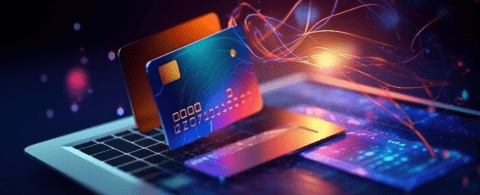Ditching Paper Checks for Digital Disbursements: 5 Use Cases
Posted by Tiffany Taylor and Alison Arthur on 08 Jul 2021


Paper checks still show up regularly in people’s mailboxes. They’re a go-to not only for personal debts but also for businesses that need to pay their employees, vendors, and customers. Mobile banking apps have streamlined the check cashing process, allowing customers to deposit checks with the snap of a smartphone camera. But many people are still willing to sign their checks, physically visit a branch location or ATM, and deposit them in person.
With so many advancements in FinTech, it’s hard to believe that paper checks are still issued to the extent that they are. Although not as popular as they used to be, pre-COVID, Americans did write out 14.5 billion checks in 2018, and as of 2019, 42% of B2B payments were still made by check. But the global pandemic may finally accelerate the demise of paper checks. In its aftermath, some 31 percent of surveyed consumers indicated they are ditching paper checks in favor of digital payments. Solutions like Zelle® have emerged to facilitate person-to-person payments without the need to write physical checks. And businesses are increasingly interested in adopting solutions that can reduce, or eliminate, their dependence on paper checks.
For businesses, this ongoing dependence on paper checks can be time-consuming, costly, and not to mention consumer-unfriendly. The costs of writing a paper check can vary anywhere from $1 to $10, depending on the nature of the business and the transaction. These costs not only include the physical components of paper checks – the printing, fulfillment, and postage – but also the employee hours spent managing the check issuing process. Add to that the financial and operational headaches of managing who has cashed outstanding checks and when, and it becomes clear that moving toward digital payouts can have a significant positive impact on business operations.
Digital Disbursements are a solution that can help businesses move away from paper checks and toward electronic payouts. With Digital Disbursements, payouts can be issued directly to payees’ bank accounts without the need for a paper check. In doing so, businesses can better manage their cash flow and operations while also providing a more streamlined experience for payees.
The need for Digital Disbursements is becoming greater as people increasingly expect on-demand payment experiences. In addition, the changing nature of our economy makes quick, payee-focused payouts more important than ever. Here are five use cases where Digital Disbursements can eliminate paper checks and streamline payouts.
Insurance Claims
Perhaps the most critical component of any insurance policy is the policyholder knowing that funds will be available when they need them. Filing an insurance claim often coincides with disruptive life events like auto accidents, severe weather, medical emergencies, or catastrophic events like fires. At these times, policyholders might need funds immediately to cover basic human needs like food, water, and shelter. The ability to issue payouts digitally to policyholders can lessen the disruption of these events and help them return to their normal lives sooner.
Healthcare
Navigating healthcare payments can be a dizzying experience involving insurance, co-insurance, deductibles, co-payments – the list goes on. Patients are often unsure of what they owe in conjunction with their insurance, which can lead to overpayment of their accounts. For healthcare providers, there can be delays in payments from their patients’ insurance companies. This can also lead to inaccurate calculations of balances owed. When a patient overpays on their account, they want the funds returned to them as quickly as possible. In these cases, Digital Disbursements can facilitate the return of funds to patients quickly and easily, without the need for a paper check.
Contract Employees and Freelance Staffing
Freelancers and contract workers are an undeniable employment force in America—and growing rapidly in light of the global pandemic. Upwork’s Freelance Forward Economics Report estimates that over one-third (36%) of Americans are freelancers and that 53% of Gen Z workers are freelancers, more than any other generation.
As more and more people flock to contract and freelance work, the need for digital payouts is increasing as well. Digital Disbursements can help mirror the experience of direct deposited paychecks while also ensuring that contractors and freelancers get their payments without any delay. This can help sustain their continued engagement and potentially reduce the risk of losing them to other short-term gigs.
The Sharing Economy and Online Marketplaces
The sharing economy has revolutionized everything from personal transportation to selling goods and services online. This decentralization means that payouts are often issued directly to individuals instead of businesses. Digital Disbursements can mean quick payouts to the underlying providers without the hassle of issuing paper checks. These electronic payouts can help keep the sharing economy and online marketplaces humming along. Supporting the streamlined experiences that customers have come to expect.
Rentals
Most rentals – whether an apartment, house, vacation property, or storage unit – require an upfront payment of a security deposit to cover any damage that might be caused by the renter. The underlying owner must maintain these funds and ultimately pay them back if the terms of the rental agreement have been met. This process can be time-consuming and even lengthier when paper checks are involved. Digital Disbursements can speed up the return of a security deposit without the renter needing to cash a physical check. For property management companies, Digital Disbursements can also be an easy, low-cost way to disburse rental payouts to underlying property owners.
The Bottom Line: As the economy changes, so do consumers’ expectations for quick and easy payouts. Digital Disbursements can help businesses modernize the payout process, eliminating the need for paper checks.
Learn about what faster payments, in general, can do for your industry in our blog.
*This is an update on an original post published January 2019
Today’s legacy and siloed banking technology infrastructure limit financial institutions’ ability to rapidly innovate. It’s time to look at money movement in a new way. Alacriti’s Orbipay Unified Money Movement Services does just that. Whether it’s real-time payments digital disbursements, or bill pay, our cloud-based platform enables banks and credit unions to quickly and seamlessly deliver modern digital payments and money movement experiences. To speak to an Alacriti payments expert, please call us at (908) 791-2916 or email info@alacriti.com.
Schedule A Personalized Demo
Schedule a Free Consultation






